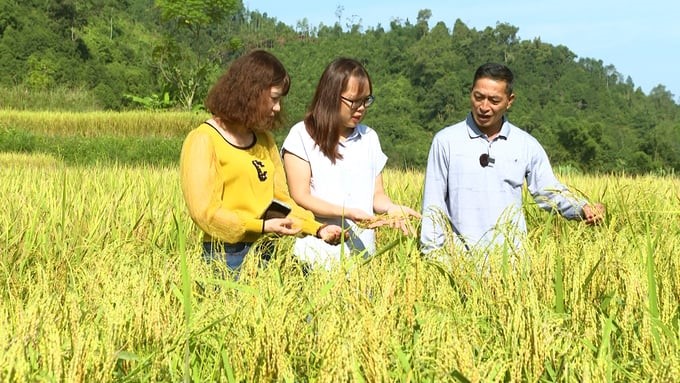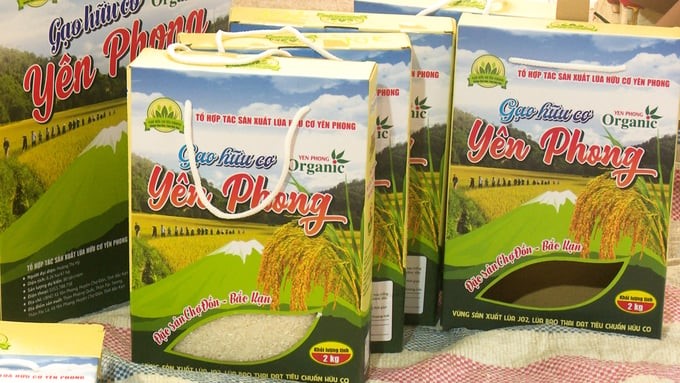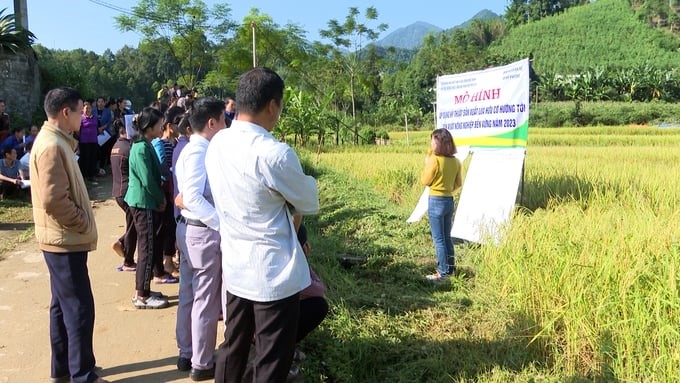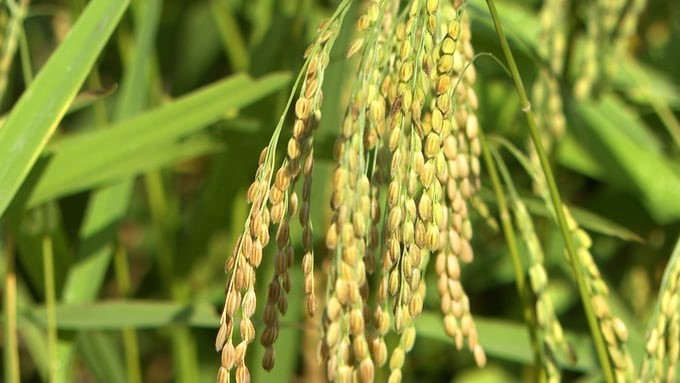May 31, 2025 | 02:53 GMT +7
May 31, 2025 | 02:53 GMT +7
Hotline: 0913.378.918
May 31, 2025 | 02:53 GMT +7
Hotline: 0913.378.918
My Phuong is a purely agricultural commune in Ba Be district (Bac Kan). For many generations, people have been familiar with old farming methods, using a lot of chemical fertilizers and pesticides, so the soil is increasingly infertile. Transforming to find new production directions is a requirement for the government and people here.
In the 2023 crop, Mr. Ha Quoc Hieu's family in Thach Ngoa 1 village (My Phuong commune) participated in the organic rice growing model for the first time. On the entire area of 4,000 m2, his family used organic fertilizer composted with microbial preparations, without the use of chemical fertilizers or pesticides. Rice in the model after harvest is purchased by businesses at a higher price than that of conventional rice farming.

Mr. Ha Quoc Hieu in Thach Ngoa 1 village (My Phuong commune, Ba Be district) introduces his family's organic rice field. Photo: Ngoc Tu.
Mr. Hieu said people participating in the model are trained on tillage, dewatering, organic fertilizer composting, and care procedures. Following organic farming procedures, especially using organic fertilizers, helps rice plants have airy leaves, harder stems, and bright yellow rice ears. Previously, the rice yield was usually only about 4 tons/ha, but after farming according to organic processes, it reached nearly 5 tons/ha.
In Yen Phong commune (Cho Don district, Bac Kan), the organic rice production model in the area is implemented on an area of more than 8 hectares with 47 participating households.
This is the second crop that people have deployed organic cultivation with the Bao Thai rice variety, which is a famous indigenous specialty rice variety. The model is supported by the Sub-Department of Crop Production—Plant Protection and Quality Management (under the Bac Kan Department of Agriculture and Rural Development) with techniques of care and pest prevention, consultancy, evaluation, and support for organic certification. The Sub-Department also provides training and organizes seminars to disseminate the model’s results to a large number of people in Cho Don district.
As a result, this year's crop, the growing area, and the rice products of the model in Yen Phong commune have met Vietnam's national organic standards (TCVN 11041-2:2017 on organic farming and TCVN 11041-4:2018 on organic rice). The organic rice-growing area in Yen Phong commune has also been granted a growing area code.
People in Yen Phong commune have also established a cooperative group with 47 members, initially forming production linkages associated with product consumption. Of which, Quoc Anh crop seed trading enterprise supplied seeds, fertilizers, probiotics, and biological preparations (allowing deferred payment). Hong Luan Cooperative and Dong Nam Viet Trading Company Limited (Donavi) linked together to consume organic rice.

The organic rice product of an organic rice-growing cooperative group in Yen Phong commune (Cho Don district). Photo: Ngoc Tu.
In the 2023 crop, it is estimated that the model in Yen Phong commune has sold nearly 3.8 tons of organic rice and more than 20 tons of organic paddy. After deducting expenses, on one hectare of organic rice farming, farmers earn a profit of VND 35 million/crop.
In addition, in the 2023 crop, the Bac Kan Sub-Department of Crop Production—Plant Protection and Quality Management also expanded the organic rice growing model with an area of 30 hectares in the villages of Pac Cop, Na Cho, Na Tac, Na Mang, and Khuoi Xom (Yen Phong commune), with the participation of 130 households. Households participating in the model receive 100% support for consultancy, evaluation, and organic certification costs, as well as technical support for care and pest prevention.
According to Mr. Hoang Thanh Binh, Deputy Director of the Bac Kan Sub-Department of Crop Production—Plant Protection and Quality Management, the organic rice plants in the models grow well and are highly resistant to pests and diseases. The entire rice area in the models does not need to be sprayed with pesticides, and the yield is quite high. Growing organic rice helps farmers reduce the cost of pesticides, chemical fertilizers, and many other supplies.
On October 20, 2021, the Bac Kan Provincial People's Committee issued Decision No. 1984/QD-UBND approving the plan “Developing organic agriculture in Bac Kan province for the period 2021–2025, with a vision to 2030”.

Bac Kan's organic rice production models are receiving the attention of many people. Photo: Ngoc Tu.
Accordingly, Bac Kan province determines that by 2025, the organic crop area will reach about 1% of the total crop area. Of which, the rice-growing area meeting organic standards reaches about 100 hectares, and by 2030, it will reach 165 hectares. Organic rice-growing areas will be concentrated in Cho Don, Ngan Son, Bach Thong, and Ba Be districts. The main rice varieties for organic production include Bao Thai, Japonica, and Khau Nua Lech rice.
To achieve this goal, Bac Kan province will support model building, training, seeds, essential materials, and funding for organic certification. Notably, this locality will also use part of the budget to provide post-investment support to businesses and cooperatives participating in the production or linkages of production, processing, and consumption of organic rice products.
In 2023 alone, the Bac Kan Department of Crop Production—Plant Protection and Quality Management is implementing seven models applying organic rice production techniques towards sustainable agricultural production with a total area of 221 hectares in the communes of Yen Thuong, Yen Thinh, and Yen Phong (Cho Don district); Dong Xa, Quang Phong (Na Ri district); My Phuong (Ba Be district); and Na Phac town (Ngan Son district). After a period of implementation, the results were positive; productivity when converting to organic rice increased compared to conventional farming.

Bac Kan has many indigenous specialty rice varieties that can be associated with organic production to build a brand and exploit multiple values. Photo: Ngoc Tu.
Mr. Hoang Thanh Binh, Deputy Director of the Bac Kan Department of Crop Production—Plant Protection and Quality Management, assessed that Bac Kan province has not much rice growing area but has the advantage of producing clean agricultural products. For a long time, people in Bac Kan used fewer chemical fertilizers and pesticides than in other localities. In particular, the climate, water sources, and soil in Bac Kan are still relatively clean, creating very favorable conditions for the province to develop organic agriculture, including rice. If there is good promotion and effective linkages between people and businesses, organic rice production will develop rapidly in the coming time.
Regarding the models being implemented, Mr. Hoang Thanh Binh said that, even though pesticides and chemical fertilizers are not used and only organic fertilizers are used, productivity is still higher than that of conventional farming. The quality of rice grains is enhanced, ensuring food safety criteria, and the soil environment is well improved. Practice shows that the organic rice growing process is quite easy to do.
In the coming time, Bac Kan province will continue to expand the area of organic rice growing. Currently, localities are mobilizing people and attracting businesses and cooperatives to participate in the linkage chain from production and processing to consumption.
Translated by Huyen Vu Thu

(VAN) Several scientists and farmers are experimenting with soil treatment in some key durian-growing regions such as Cai Lay (Tien Giang), Dak Song, Gia Nghia, and Dak R’lap (Dak Nong).
/2025/05/25/4127-3-073637_820.jpg)
(VAN) Thanks to the promotion from an FAO-implemented project, vegetable production in greenhouses in Moc Chau has seen strong development, from 1.5 hectares in 2021 to nearly 50 hectares in 2024.

(VAN) FAO has recently supported USD 140,000 to implement the project 'Risk mitigation human-animal interface risks through disease control initiatives in pig farming.'

(VAN) The People's Committee of Tra Vinh province has approved an adjustment to the investment policy for the Green Hydrogen Plant project, increasing its area to approximately 52.76 hectares.
![Reducing emissions from rice fields: [2] Farmers’ commitment to the soil](https://t.ex-cdn.com/nongnghiepmoitruong.vn/608w/files/news/2025/05/05/dsc08881jpg-nongnghiep-140632.jpg)
(VAN) Clean rice cultivation model in Thuong Tan commune, Bac Tan Uyen district, is assisting local residents in achieving sustainable agriculture by substantially reducing costs, increasing productivity, and protecting the environment.

(VAN) At the conference to disseminate Resolution No. 68, AgriS introduced its digital agricultural ecosystem and reaffirmed its commitment to accompanying the Government in promoting private sector development and sustainable agriculture.

(VAN) 'Blue Ocean - Blue Foods' initiative is designed to restore marine ecosystems and establish sustainable livelihoods for local communities by cultivating a minimum of 1,000 hectares of cottonii seaweed in the first three years.